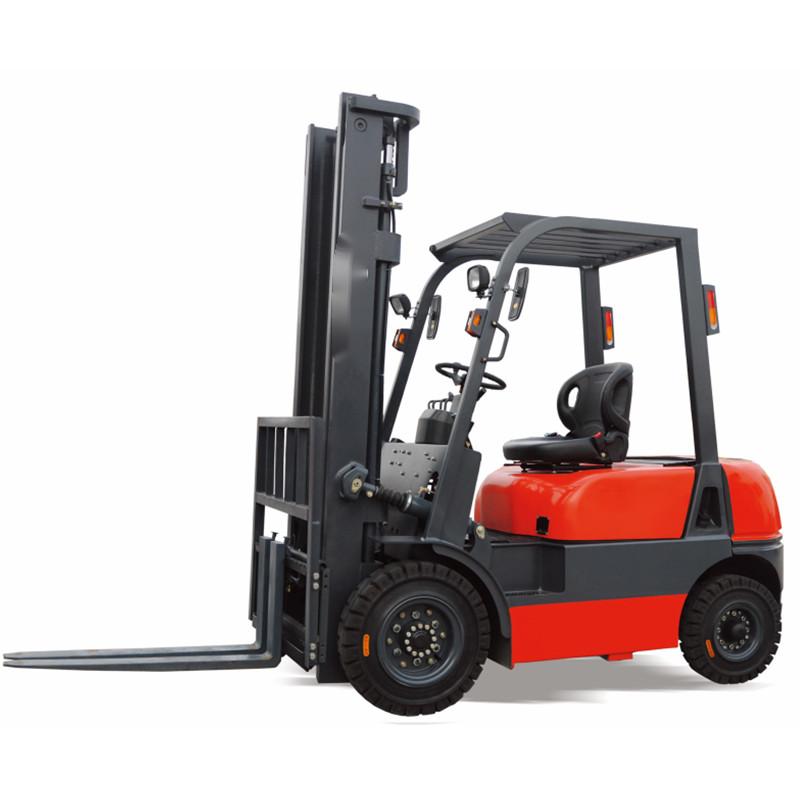Although fuel-powered forklifts have certain advantages in terms of power and endurance, they also have many obvious disadvantages, which are mainly reflected in the following aspects:

1. Poor environmental protection and serious pollution
- Exhaust emission pollution: Fuel-powered forklifts (including diesel, gasoline, liquefied petroleum gas, etc.) emit a large amount of exhaust gas during operation, which contains harmful substances such as carbon monoxide, nitrogen oxides, hydrocarbons, and particulate matter. These exhaust gases not only pollute the atmospheric environment but also damage the respiratory systems of operators and people around them. Long-term exposure may lead to health problems such as respiratory diseases and lung damage.
- Noise pollution: The engine of fuel-powered forklifts produces relatively high noise during operation, usually 70-90 decibels or even higher. Long-term exposure to high-noise environments will affect the hearing of operators, and may also cause problems such as irritability and inattention, increasing the risk of operational errors.
2. High usage cost
- Fuel cost: Fuel-powered forklifts need to continuously consume fuels such as diesel and gasoline. With the fluctuation of fuel prices, the long-term fuel cost is relatively high. Especially in high-intensity operation scenarios, fuel consumption is large, and the cost expenditure is more obvious.
- Maintenance cost: The structure of the fuel engine is relatively complex, containing many moving parts (such as pistons, crankshafts, valves, etc.), so there are more maintenance items and higher frequency. For example, it is necessary to regularly replace engine oil, oil filters, fuel filters, air filters, etc., and it may also involve engine overhaul and fuel system cleaning, all of which will increase the maintenance cost.
3. Many restrictions on operation and use
- Inconvenience in starting and operation: Fuel-powered forklifts need to be preheated when starting (especially in low-temperature environments), and the starting process is relatively cumbersome; moreover, operators need to control the throttle and clutch during operation, which has higher requirements for their skills.
- Restrictions on operating environment: Due to the emission of exhaust gas and noise, fuel-powered forklifts are not suitable for long-term operation in closed or semi-closed indoor environments (such as warehouses and workshops), otherwise, it will lead to the deterioration of indoor air quality and affect people's health; at the same time, they cannot be used in places with high environmental requirements (such as food processing plants and pharmaceutical workshops).
4. Safety hazards
- Risk of fuel leakage: If the fuel system of fuel-powered forklifts (such as fuel tanks, oil pipes, fuel injectors, etc.) is aged or damaged, it may lead to fuel leakage. Fuel is a flammable substance, and once it encounters an open flame (such as sparks, high-temperature objects), it is very easy to cause fire or even explosion accidents.
- Risk of exhaust gas poisoning: In poorly ventilated environments, the exhaust gas emitted by fuel-powered forklifts cannot be diffused in time, which will lead to an increase in the concentration of toxic gases such as carbon monoxide. Operators may experience poisoning symptoms such as dizziness, nausea, and difficulty breathing after inhaling, and in severe cases, it may even be life-threatening.
5. Other disadvantages
- Limited maneuverability: Fuel-powered forklifts are usually heavier than electric forklifts, and their flexibility in steering and moving in narrow spaces is poor, which is not conducive to operation in complex terrain or small sites.
- Policy restrictions: With the increasingly strict environmental protection policies, many regions have imposed restrictions or controls on the use of fuel-powered forklifts, such as requiring the installation of exhaust gas purification devices and restricting access to specific areas, which increases the use cost and difficulty of fuel-powered forklifts.
To sum up, fuel-powered forklifts have many disadvantages in terms of environmental protection, cost, operation, and safety. In scenarios with high environmental protection requirements, closed operating environments, and cost sensitivity, alternative products such as electric forklifts have more advantages.


